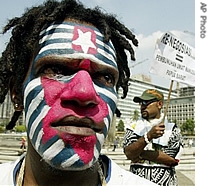2007年VOA标准英语-Human Rights Group Reports Abuses in Indonesia'(在线收听)
Jakarta
21 February 2007
U.S.-based Human Rights Watch says Indonesia should immediately release political prisoners in Papua. In a report released Wednesday, the rights group says Jakarta's actions in Papua are a stain on its democracy, and that reporting restrictions in the area should be lifted. Chad Bouchard reports from Jakarta.
 |
| Papuan activist with the flag of the Free Papua movement painted on his face demonstrates against the Indonesian army (File) |
The new report highlights 18 political prisoners in Papua but suggests there are likely to be many more abuses that have not yet been uncovered.
Foreign journalists, diplomats and human rights observers are banned from visiting Papua. Human Rights Watch could not interview prisoners but spoke to defense lawyers and local human rights groups, and analyzed trial documents.
Human Rights Watch researcher Charmain Mohamed says while Indonesia is making good progress in democratization, the government's approach in Papua is hypocritical.
"I mean these are people who've been in prison and convicted purely for peaceful expressions, mostly for raising flags or attending independence meetings and they're getting prison sentences - in one case 15 years, other cases 10 years, 8 years - purely for peaceful expression," said Mohamed. "And I think it's very important that these kind of issues are exposed to the international community to show that Indonesia has a very long way to go before it becomes a rights-respecting country."
The organization is calling for Indonesia to immediately release the 18 political prisoners, and drop outstanding charges against peaceful protesters.
Mohamed says the report also demands that the Indonesian government lift its restrictions on visits by journalists and international observers.
"Key thing to do would be to unconditionally release all of the political prisoners in Papua and to make a public statement at the highest level that they will commit to not undertaking any further prosecution of this kind. The other key recommendation would be to open access," she said. "The international community, donors to Indonesia also have to continue to advocate for open access to Papua and the release of the prisoners."
Mohamed adds that Indonesia should repeal colonial-era laws used to convict protesters on treason or rebellion charges.
Papua, formerly called Irian Jaya, is remote from the capital Jakarta in geography, ethnicity and culture. It has a history of dispute with the political center since its controversial annexation from Dutch rule in 1963. Many of those arrested have raised flags seen as a symbol of Papua's independence movement.
Tensions flared in March 2005 when four police officers died in clashes during a protest demanding closure of the large gold and copper mine owned by U.S. company Freeport.
Indonesia denies committing any human rights abuses, saying reported violations are isolated incidents by rogue elements in the country's military.